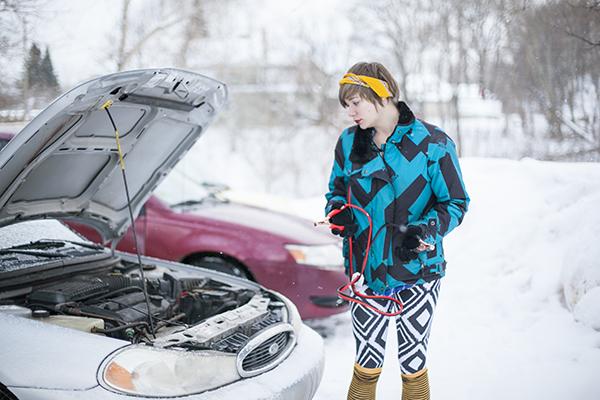A student walks out the lower entrance of the Learning Resource Center, and digs for his car keys. The car’s taillights flash as he presses the unlock button on the key fob, and he stops for a second before climbing in.
Something is wrong: the front right tire is flat, rim on the ground.
There’s a spare in the trunk, but that’s flat too; what’s more, part of the car jack is missing. His dad’s advice to keep track of this sort of thing no longer seemed so asinine.
Never expecting it would one day come to this, he gets back into the still-running car and dials NMU Public Safety.
“Hello, can I get someone from Motorist Assistance to come to the commuter lot by the LRC?”
“Well…” the other end of the phone said, “there actually… isn’t a Motorist Assistance Program anymore.”
In fact, the voice said, Public Safety can’t even send an officer in a normal car to help. There’s a liability problem with jacking up cars and helping with flat tires.
The one time he actually wants a cop around, naturally, they wanted nothing to do with him.
Students used to rely on the services of Motorist Assistance from the campus police to jump dead batteries, dig out cars stuck in snow banks and help fix flat tires. None of these are offered by Public Safety any longer, under any program.
There was no announcement concerning the loss of this program.
In fact, NMU Public Safety’s website currently states that students can rely on help from the program to deal with car troubles.
Erik Lewis, a senior computer science major, said while he never made use of the program he certainly sees the benefit of keeping it in place.
“Now if I have trouble I am probably going to have to pay to get help,” Lewis said. “College kids don’t have a lot of money to spare so it would be nice to have that program as a safety net.”
With multiple full parking lots on campus and a strong representation of commuters, it seemed out of place for NMU to cut a program like Motorist Assistance. Mike Bath, director of NMU’s Public Safety, explained why the program ended.
“It’s actually not a budgeting concern at all,” Bath said. “It’s all about the way that our insurance works.”
Bath said Public Safety sat down with insurance agents recently and were told they actually weren’t covered under their liability policy to do many of the things they had been doing.
Among the liable actions: helping students with flat tires, jumping dead batteries and digging cars out of snowbanks, perhaps the three most valuable services that the program was providing in the winter months.
Bath also said that Public Safety has had plenty of calls from students looking for help recently.
They’ve had to refer the students to towing services around town, which could present issues because unlike a for-profit auto garage, Motorist Assistance was always free. Towing companies are in the game to make money, and they have no special obligation to help students first, or for a reduced rate at that matter.
“At this point we’re still helping with vehicle lockouts, because we’re insured for that,” Bath said. “If a window breaks or something, we’re covered. We’re working on a solution so that we can continue helping students who have car trouble in the near future, but with the liability issues I don’t see it happening this year.”
So the next time you’re locked out of your car, don’t hesitate to give Public Safety a call. If you’re in need of more than that you’d be better off calling a friend who has jumper cables.
Cody Hewitt, a junior computer science major, says the motor assistance program was great for people who didn’t have a lot of friends to call for help.
“We should be helping each other out more and picking up the slack from Public Safety,” Hewitt said.
“This is the U.P. after all.”





























